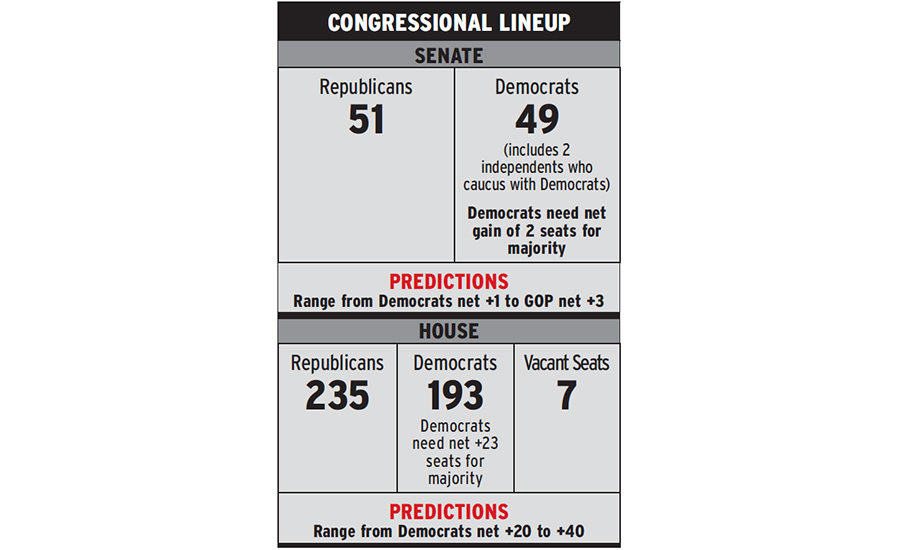Midterm election predictions at ENR press time give Democrats a decent chance of taking a House majority and Republicans retaining their Senate hold. That forecast isn’t a sure thing. But if it proves true on Nov. 6, construction views are split about whether a big infrastructure bill will fly in a divided Congress. Another question is whether a growing federal deficit will prevent a repeat of this year’s budget deal that gave infrastructure programs a two-year bonus of at least $20 billion.
In the Senate, Democrats need a net gain of two seats to wrest control from the GOP. But analysts predict Democrats will at best pick up one seat and Republicans may gain up to three. In the House, with seven current vacancies, Democrats need a 23-seat gain for the majority. They’re projected to add 20 to 40.
Some observers hope bipartisanship will propel a major infrastructure bill in 2019. Both sides have pro-infrastructure histories. In February, President Trump released a plan he pegged at $1.5 trillion over 10 years. In March, Senate Democrats issued a $1-trillion, 10-year plan.
Trump said in an Oct. 11 televised interview he sees “a possibility” that his administration and Democrats can “get along” with each other. “They want infrastructure,” he said. “I want infrastructure. There’s something that can bring us together.” There’s also a gap: The Democrats’ plan is all direct federal spending, compared with just $200 billion in Trump’s.
The key to passing an infrastructure bill will be finding ways to pay for it, an industry source notes, and adds, “I don’t really see a revenue source materializing in 2019.” Marco Giamberardino, National Electrical Contractors Association executive director for government affairs, says if Democrats win the House and take a “measured” stance, “there may be a chance for something significant on the infrastructure side to happen.” He adds, “If that were to be the case, that may be the only big thing that really gets done.”
Construction also will watch how infrastructure fares in fiscal 2020 appropriations. A February budget pact had a $20-billion infrastructure boost in 2018-19. But the Congressional Budget Office said Oct. 5 the 2018 deficit rose $116 billion, sparking worries about the impact on future construction spending. “Clearly we’ve already heard the rumblings that it’s going to be more difficult for the appropriations process,” says Brian Pallasch, an American Society of Civil Engineers managing director. “Deficits are now going to matter. … If we’re going to shrink the appropriations pie, that’s of concern.”
Sean O’Neill, an Associated General Contractors of America vice president, says, “We would hope that the additional money we got in ’18 and ’19 would be the baseline going forward and we’ll advocate for that.” But he says deficit projections make reaching that goal a challenge.





